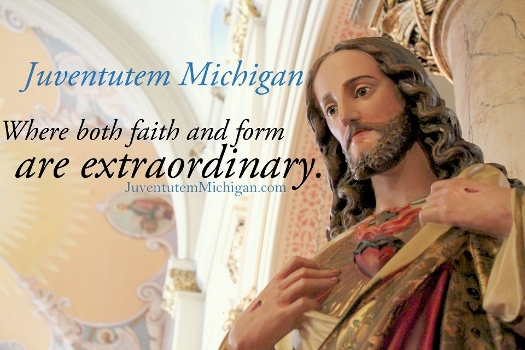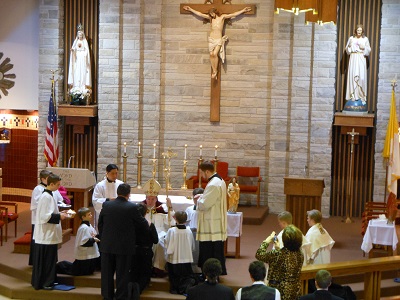
"I will go in unto the Altar of God
To God, Who giveth joy to my youth"
Tridentine Community News (March 9, 2014):

Archbishop Vigneron Confers the Sacrament of Confirmation According to the Extraordinary Form
For the second time since becoming Archbishop of Detroit in 2009, Archbishop Allen Vigneron has administered the Sacrament of Confirmation according to the Tridentine formula. Last Sunday, March 2, His Excellency attended the weekly Tridentine Mass at St. Edward on the Lake Parish in Lakeport, north of Port Huron. Fr. Lee Acervo, pastor of St. Edward, was the celebrant of the Mass. Archbishop Vigneron preached the homily, then after Mass confirmed five young souls. He was assisted at the altar by his secretary, Fr. Stephen Pullis.
Why Evangelize?
Some food for thought was recently posted by Professor Peter Kwasniewski of Wyoming Catholic College on The New Liturgical Movement blog: “...preaching the Good News to unbelievers is effective only to the extent that there is something profoundly and transcendently good awaiting them when they arrive at church.” Those of us who embrace traditional liturgy certainly believe that the Extraordinary Form offers a transcending worship experience, but are we using that conviction to attract others to the Tridentine Mass, non-Catholics in particular?
The Future of the Reform of the Reform Movement
In recent weeks, a flurry of articles penned by major figures on the liturgical scene have raised the question of whether there is a future for the Reform of the Reform. The ROTR is the movement to add solemnity to the Ordinary Form by modifying the Mass to incorporate elements of the Tridentine Mass into it. Which elements to include, of course, is a matter of debate.
What distinguishes the current round of discussions from previous ones is that some of the movement’s most ardent advocates over the past decade are now concluding that the ROTR may not be realistic. ROTR proponents were encouraged by Pope Emeritus Benedict’s writings and actions, but now that we have a new Holy Father whose primary interests are not in the realm of liturgy, it is reasonable to ask if reforming the liturgy is possible at the present time.
One or two voices are raising the question of whether the 1965 Missal, the interim missal which eliminated the Prayers at the Foot of the Altar, the Last Gospel, and a few other elements of the Tridentine Mass, while also permitting a limited use of the vernacular, might represent a better starting point for a reformed liturgy. Whether or not this is a meritorious approach, it, too, would require endorsement of the reigning Holy Father, thus it is not a very realistic option right now.
All parties seem to agree that the most practical present path is to encourage reverent celebrations of the Ordinary Form using the currently in-force missal, employing traditional options such as the Aspérges, the Roman Canon, ad oriéntem celebration, Latin, and Gregorian Chant. What is most significant is that so many former ROTR proponents have become convinced that the best way to promote solemn liturgy in the Church going forward is to encourage more frequent celebrations of the Tridentine Mass.
1974 Graduále Románum Placed On-Line
Speaking of the solemn celebration of the Ordinary Form, there is a news item that warrants attention, even though it does not pertain to the Extraordinary Form:
Corpus Christi Watershed is an organization well-known for publishing numerous resources for Catholic musicians. From hymnals and Gregorian Chant sheet music for the Ordinary and Extraordinary Forms, to slickly-produced videos depicting the Church Music Association of America’s Colloquia, CCW, headed by composer Jeff Ostrowski, has done a tremendous amount of good. Most of their offerings are available at no charge on their web site.
This past month, CCW has once again done a great service to the sacralization of the Liturgy by scanning in and posting on its web site the main book for cantors and choirs to use when chanting the Latin Propers for the Ordinary Form: the Graduále Románum, published in 1974 by the Monks of Solesmes, France. Until now, this edition of the Graduále has been a fairly difficult book to obtain. The first step in making it possible for choirs to sing the Proper Chants of the Ordinary Form of Holy Mass is to make the main book of chants easily accessible, and this has now been done.
Tridentine Masses This Coming Week
- Mon. 03/10 7:00 PM: Low Mass at St. Joseph (Feria of Lent)
- Tue. 03/11 7:00 PM: Low Mass at St. Benedict/Assumption-Windsor (Feria of Lent)
- Sat. 03/15 8:00 AM: Low Mass at Our Lady of the Scapular, Wyandotte (Ember Day of Lent)
- Sun. 03/16 12:00 Noon: High Mass at St. Albertus (Second Sunday of Lent)



2 comments:
The TLM certainly is a tool of evangelism. I returned to the Church in 2007 thanks to a Sunday visit to St. Josaphat's in Detroit. I wasn't willing to go the NO route due to my bad experiences with liturgies, homilies and catechetics as a child in the 70s and 80s. Without the TLM as an option, I probably would have ended up with the Eastern Orthodox.
St Josaphat's will always be my spiritual home even though I haven't been there since 2009, and even though the church is temporarily closed. While there, I had the good fortune to sit in front of Tim Ferguson who has an excellent voice and command of chant. I was pleasantly surprised when I ran into him here in Portland at a TLM at Holy Rosary priory. Bless him for answering the call to the priesthood.
Sorry I never met your acquaintance (at least that I remember) while in Detroit. I've appreciated your blog for several years now.
Thank you, Mr. Woltze. It would be a pleasure to meet you too.
Post a Comment